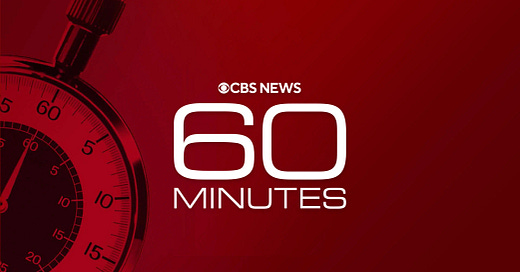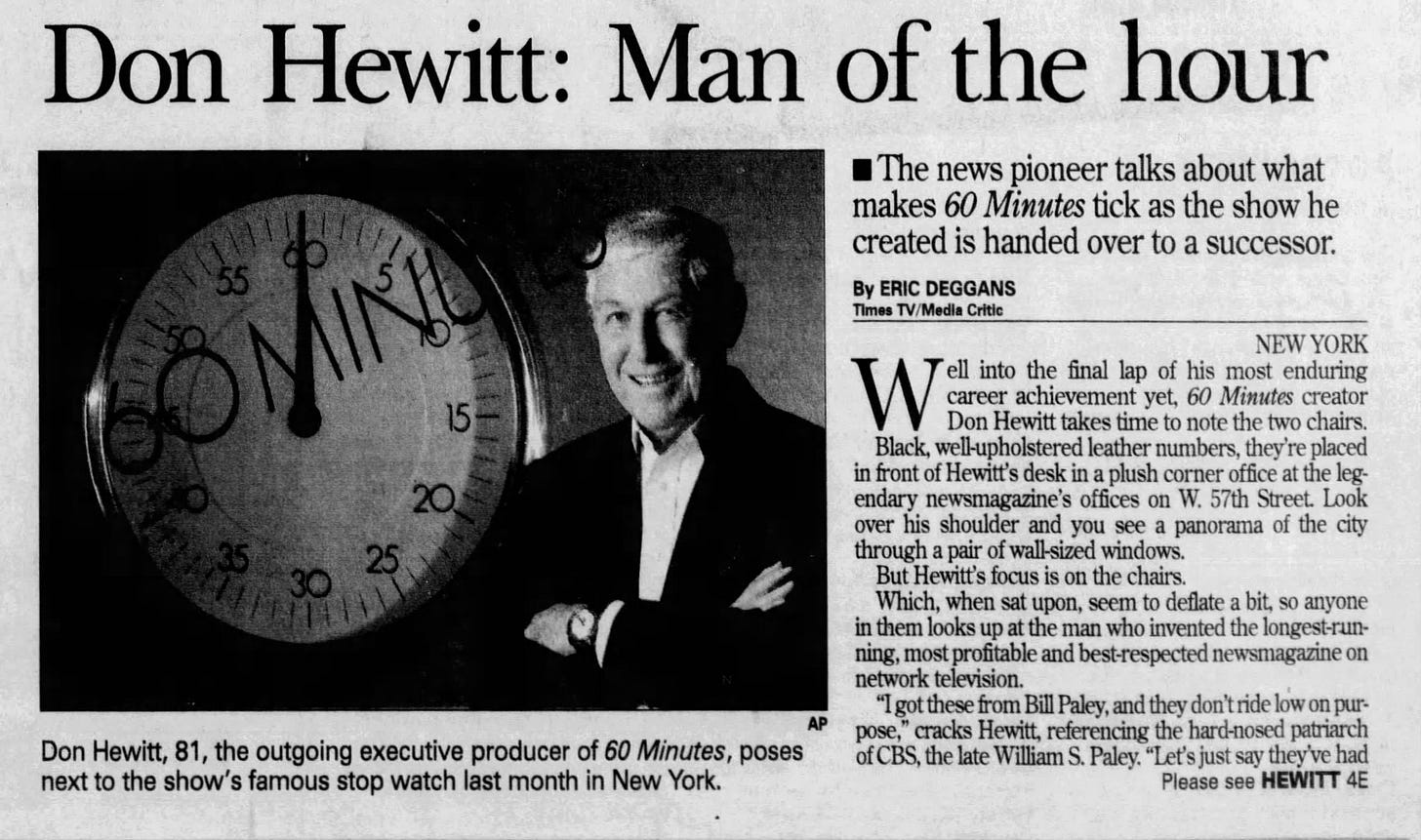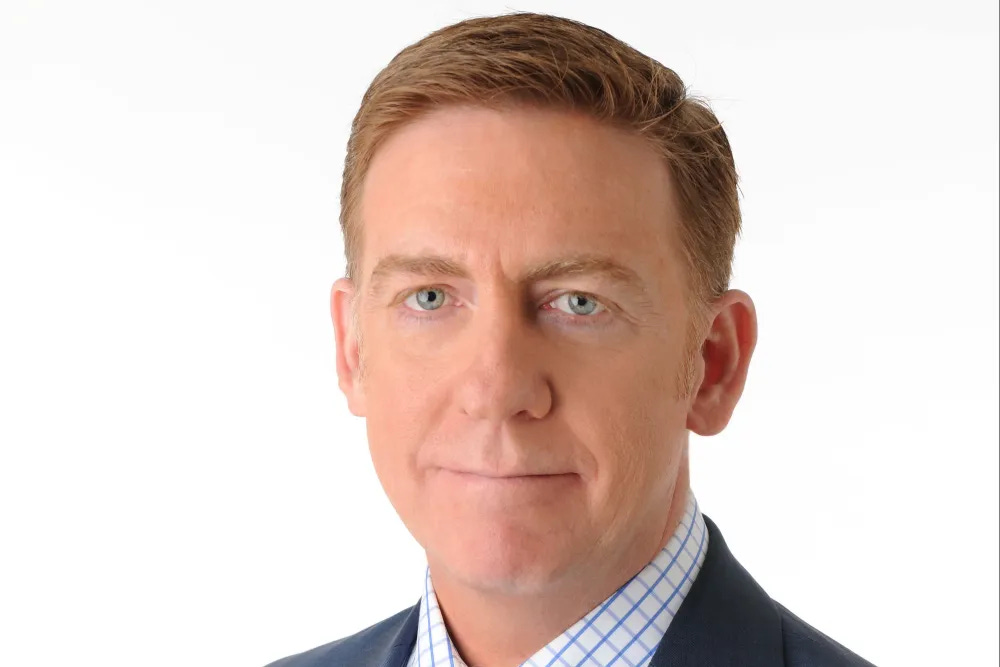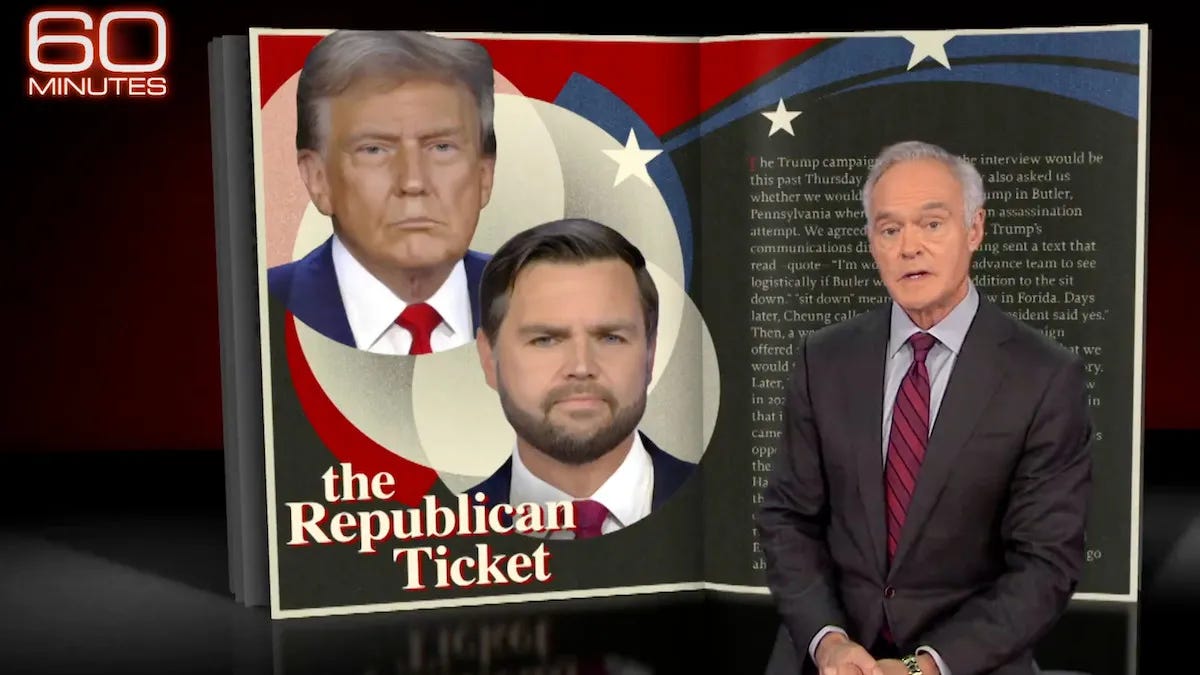Amid turmoil at '60 Minutes,' why are courts upholding journalism better than some media owners?
The departure of 60 Minutes EP Bill Owens reminds me of a fateful meeting years ago with the show's creator, Don Hewitt
I had the good fortune of visiting the Manhattan offices of 60 Minutes back in 2004 when its creator and longest -serving executive producer, Don Hewitt, was still alive.
The show, which had offices apart from the rest of CBS News, was notorious for eschewing glitz — so their offices were basic, with worn carpeting and furniture older than the aging correspondents who worked there. Except for Hewitt’s space, which I remember having a big, sleek imposing desk, an amazing view of the city and plush chairs, set up so that visitors sat a little lower than the big boss.
It was like getting an audience with TV news’ version of Frank Sinatra.
Hewitt, who died in 2009, helped develop a lot of things we now take for granted in TV news – from cue cards to working on broadcast legend Edward R. Murrow’s landmark news show See it Now and working on the first televised presidential debate, between John F. Kennedy and Richard Nixon.
But what he really did, in creating the successful TV newsmagazine 60 Minutes, was show that TV news could make lots of money – a development he openly recognized as a double-edged sword.
That’s what has struck me now, in the wake of the announcement that the current executive producer of 60 Minutes, Bill Owens, has left CBS News after 37 years -- a Hail Mary attempt to bring worldwide attention over how the show’s journalistic autonomy has been affected by meddling at the corporate level.
(Click here to hear me talking about Owens’ departure on NPR’s Morning Edition today.)
It’s a sad fact that, even as President Donald Trump launches a series of unprecedented attacks on news outlets whose reporting he does not like, those who own many of the biggest media platforms have been treating journalism as a faltering department or a failing subsidiary. Not as the important bulwark of democracy that the free press truly is.
In fact, America’s court system seems to be doing a better job of defending journalism’s independence than many of the companies which own major news outlets. More on that further down.
(Former 60 Minutes executive producer Bill Owens)
Owens and his boss, CBS News president and CEO Wendy McMahon, didn’t mention Donald Trump’s moves against the show in their complimentary memos issued Tuesday detailing his departure. (“It has…become clear that I would not be allowed to run the show as I have always run it,” Owens writes. “To make independent decisions based on what was right for 60 Minutes.”)
Owens seemed to be chafing at oversight placed on the show by executives at the parent company which owns CBS, Paramount Global, as Trump pursues a $20 billion lawsuit against the company and 60 Minutes, which has presented some tough coverage of him.
Shari Redstone, the controlling owner of Paramount, has made no secret of her desire to sell the company to Skydance Media, which requires government approval. It’s widely assumed that Paramount’s agreement on a mediator in Trump’s weak lawsuit against the company over the editing of a 60 Minutes interview, telegraphs intentions to settle the case, possibly placating the President.
(Semafor reports that Redstone sought to keep tabs on which stories 60 Minutes was doing about Trump. A spokesperson for Redstone denied to Semafor that she saw or sought to see such stories.)
Redstone’s not alone among owners of media outlets who have allowed independence and upholding journalism values to take a back seat to corporate priorities. Jeff Bezos at the Washington Post, Los Angeles Times owner Patrick Soon-Shiong, Facebook’s Mark Zuckerberg and the DOGE-man himself, X/Twitter owner Elon Musk, have all taken actions which sure look like prioritizing their overall business interests at the expense of the credibility and quality of the platforms they control.
Compare their actions to recent court decisions, including: a jury determining the New York Times did not libel former Alaska Gov. Sarah Palin; a judge ruling the Trump administration could not exclude the Associated Press from White House events; and a federal judge reversing efforts by the Trump administration to dismantle Voice of America, finding the government illegally shut down the 83-year-old service while lawsuits are ongoing over attempts to pull its funding.
These courts have buttressed journalists’ First Amendment rights and efforts to continue independent reporting, even when companies which own media outlets faltered. Which should shame the people who have taken on the massive responsibility of owning and running massive platforms.
Our current journalistic moment also feels like a sad progression in the news industry’s connection to American society. When Hewitt was first creating 60 Minutes, most TV outlets saw news broadcasts as a public service. They weren’t expected to make money and they largely lived down to that expectation.
They were expected to inform the public and hold big institutions – especially the government – accountable.
Then, thanks to successful news-based shows like 60 Minutes, Today, Nightline and Dateline NBC, the media industry began to hold news programming to the same profit expectations as any show. Innovations like CNN and Fox News Channel extended that notion to cable TV.
Now, as journalism profits recede again, there seems to be less regard for the public service element of journalism by some corporate leaders — who show little hesitation to damage the reputation of news outlets they control if a change is required to serve a larger corporate goal.
It all comes back to a potent argument for public media, where commercial concerns are minimized. And the need for those who own important journalistic outlets to treat those platforms like a public service once again – not just another underperforming brand to be brought in line.








Sharply reasoned, this commentary is precisely the factual report on a significant issue that the news media — legacy or new, print or electronic, national or regional — should be publishing all the time. Caving into the bully only strengthens his belief that what he wants is what should be done, never mind the Constitution and the freedoms it guarantees, nor the nation’s accepted governance, culture or economy.